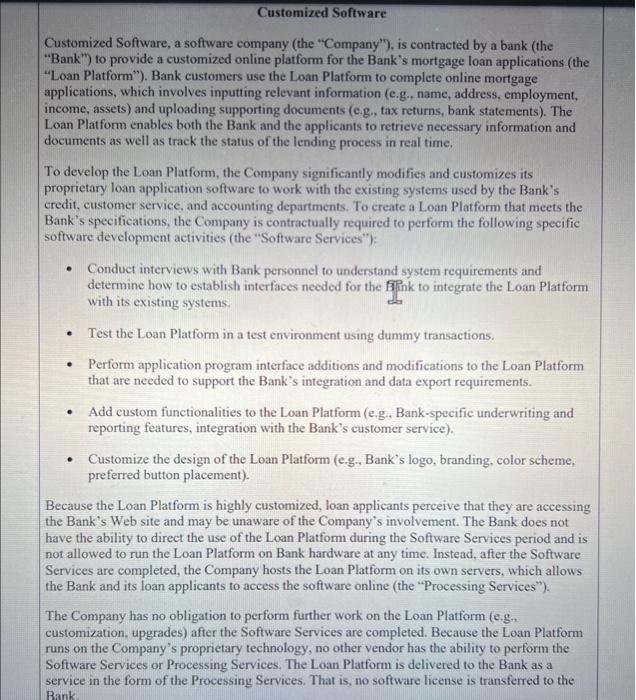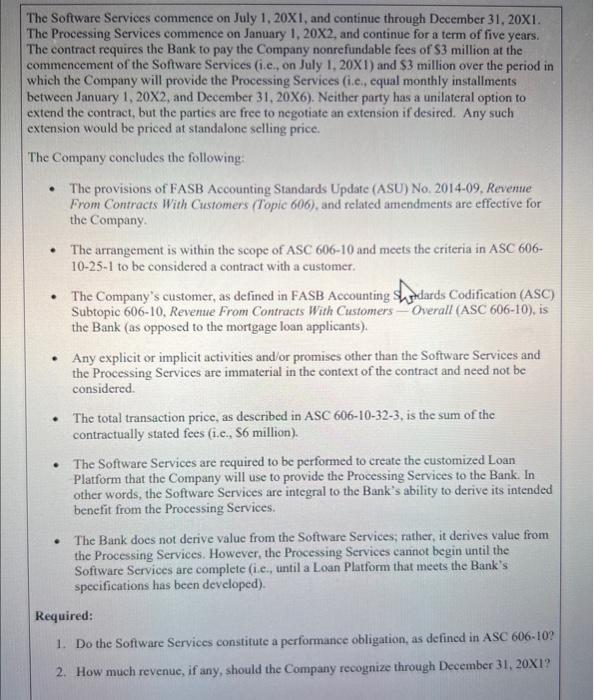Customized Software Customized Software, a software company (the "Company"), is contracted by a bank (the "Bank") to provide a customized online platform for the Bank's mortgage loan applications (the "Loan Platform"). Bank customers use the Loan Platform to complete online mortgage applications, which involves inputting relevant information (e.g., name, address, employment, income, assets) and uploading supporting documents (e.g., tax returns, bank statements). The Loan Platform enables both the Bank and the applicants to retrieve necessary information and documents as well as track the status of the lending process in real time. To develop the Loan Platform, the Company significantly modifies and customizes its proprietary loan application software to work with the existing systems used by the Bank's credit, customer service, and accounting departments. To create a Loan Platform that meets the Bank's specifications, the Company is contractually required to perform the following specific software development activities (the "Software Services"): - Conduct interviews with Bank personnel to understand system requirements and determine how to establish interfaces needed for the BPink to integrate the Loan Platform with its existing systems. - Test the Loan Platform in a test environment using dummy transactions. - Perform application program interface additions and modifications to the Loan Platform that are needed to support the Bank's integration and data export requirements. - Add custom functionalities to the Loan Platform (e.g., Bank-specific underwriting and reporting features, integration with the Bank's customer service). - Customize the design of the Loan Platform (e.g., Bank's logo, branding, color scheme, preferred button placement). Because the Loan Platform is highly customized, loan applicants perceive that they are accessing the Bank's Web site and may be unaware of the Company's involvement. The Bank does not have the ability to direct the use of the Loan Platform during the Software Services period and is not allowed to run the Loan Platform on Bank hardware at any time. Instead, after the Software Services are completed, the Company hosts the Loan Platform on its own servers, which allows the Bank and its loan applicants to access the software online (the "Processing Services"). The Company has no obligation to perform further work on the Loan Platform (e.g., customization, upgrades) after the Software Services are completed. Because the Loan Platform runs on the Company's proprietary technology, no other vendor has the ability to perform the Software Services or Processing Services. The Loan Platform is delivered to the Bank as a service in the form of the Processing Services. That is, no software license is transferred to the Bank The Software Services commence on July 1, 20X1, and continue through December 31,201. The Processing Services commence on January 1, 20X2, and continue for a term of five years. The contract requires the Bank to pay the Company nonrefundable fees of $3 million at the commencement of the Software Services (i.e., on July 1, 20X1) and $3 million over the period in which the Company will provide the Processing Services (i.e., cqual monthly installments between January 1, 20X2, and December 31,206 ). Neither party has a unilateral option to extend the contract, but the partics are free to negotiate an extension if desired. Any such extension would be priced at standalone selling price. The Company concludes the following: - The provisions of FASB Accounting Standards Update (ASU) No, 2014-09, Reventie From Contracts With Customers (Topic 606), and related amendments are effective for the Company. - The arrangement is within the scope of ASC 606-10 and meets the criteria in ASC 60610251 to be considered a contract with a customer. - The Company's customer, as defined in FASB Accounting ondards Codification (ASC) Subtopic 606-10, Revente From Contracts With Customers - Overall (ASC 606-10), is the Bank (as opposed to the mortgage loan applicants). - Any explicit or implicit activities and/or promises other than the Software Services and the Processing Services are immaterial in the context of the contract and need not be considered. - The total transaction price, as described in ASC 606-10-32-3, is the sum of the contractually stated fees (i.c., $6 million). - The Software Services are required to be performed to create the customized Loan Platform that the Company will use to provide the Processing Services to the Bank. In other words, the Software Services are integral to the Bank's ability to derive its intended benefit from the Processing Services. - The Bank does not derive value from the Software Services; rather, it derives value from the Processing Services. However, the Processing Services cannot begin until the Software Services are complete (i.e., until a Loan Platform that meets the Bank's specifications has been developed). Required: 1. Do the Software Services constitute a performance obligation, as defined in ASC 60610? 2. How much revenue, if any, should the Company recognize through December 31,201 ? Customized Software Customized Software, a software company (the "Company"), is contracted by a bank (the "Bank") to provide a customized online platform for the Bank's mortgage loan applications (the "Loan Platform"). Bank customers use the Loan Platform to complete online mortgage applications, which involves inputting relevant information (e.g., name, address, employment, income, assets) and uploading supporting documents (e.g., tax returns, bank statements). The Loan Platform enables both the Bank and the applicants to retrieve necessary information and documents as well as track the status of the lending process in real time. To develop the Loan Platform, the Company significantly modifies and customizes its proprietary loan application software to work with the existing systems used by the Bank's credit, customer service, and accounting departments. To create a Loan Platform that meets the Bank's specifications, the Company is contractually required to perform the following specific software development activities (the "Software Services"): - Conduct interviews with Bank personnel to understand system requirements and determine how to establish interfaces needed for the BPink to integrate the Loan Platform with its existing systems. - Test the Loan Platform in a test environment using dummy transactions. - Perform application program interface additions and modifications to the Loan Platform that are needed to support the Bank's integration and data export requirements. - Add custom functionalities to the Loan Platform (e.g., Bank-specific underwriting and reporting features, integration with the Bank's customer service). - Customize the design of the Loan Platform (e.g., Bank's logo, branding, color scheme, preferred button placement). Because the Loan Platform is highly customized, loan applicants perceive that they are accessing the Bank's Web site and may be unaware of the Company's involvement. The Bank does not have the ability to direct the use of the Loan Platform during the Software Services period and is not allowed to run the Loan Platform on Bank hardware at any time. Instead, after the Software Services are completed, the Company hosts the Loan Platform on its own servers, which allows the Bank and its loan applicants to access the software online (the "Processing Services"). The Company has no obligation to perform further work on the Loan Platform (e.g., customization, upgrades) after the Software Services are completed. Because the Loan Platform runs on the Company's proprietary technology, no other vendor has the ability to perform the Software Services or Processing Services. The Loan Platform is delivered to the Bank as a service in the form of the Processing Services. That is, no software license is transferred to the Bank The Software Services commence on July 1, 20X1, and continue through December 31,201. The Processing Services commence on January 1, 20X2, and continue for a term of five years. The contract requires the Bank to pay the Company nonrefundable fees of $3 million at the commencement of the Software Services (i.e., on July 1, 20X1) and $3 million over the period in which the Company will provide the Processing Services (i.e., cqual monthly installments between January 1, 20X2, and December 31,206 ). Neither party has a unilateral option to extend the contract, but the partics are free to negotiate an extension if desired. Any such extension would be priced at standalone selling price. The Company concludes the following: - The provisions of FASB Accounting Standards Update (ASU) No, 2014-09, Reventie From Contracts With Customers (Topic 606), and related amendments are effective for the Company. - The arrangement is within the scope of ASC 606-10 and meets the criteria in ASC 60610251 to be considered a contract with a customer. - The Company's customer, as defined in FASB Accounting ondards Codification (ASC) Subtopic 606-10, Revente From Contracts With Customers - Overall (ASC 606-10), is the Bank (as opposed to the mortgage loan applicants). - Any explicit or implicit activities and/or promises other than the Software Services and the Processing Services are immaterial in the context of the contract and need not be considered. - The total transaction price, as described in ASC 606-10-32-3, is the sum of the contractually stated fees (i.c., $6 million). - The Software Services are required to be performed to create the customized Loan Platform that the Company will use to provide the Processing Services to the Bank. In other words, the Software Services are integral to the Bank's ability to derive its intended benefit from the Processing Services. - The Bank does not derive value from the Software Services; rather, it derives value from the Processing Services. However, the Processing Services cannot begin until the Software Services are complete (i.e., until a Loan Platform that meets the Bank's specifications has been developed). Required: 1. Do the Software Services constitute a performance obligation, as defined in ASC 60610? 2. How much revenue, if any, should the Company recognize through December 31,201








